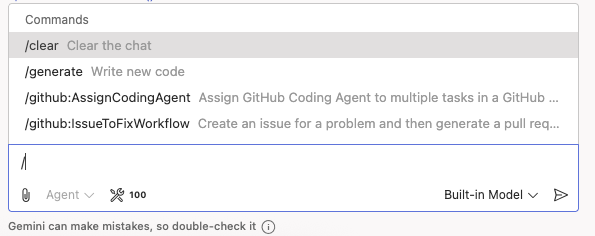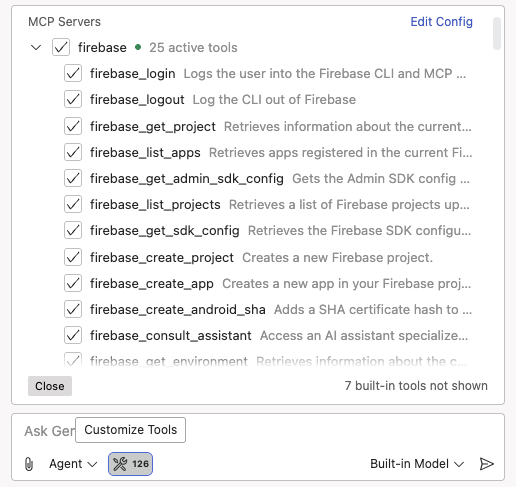MCP servers provide Gemini with additional tools and data sources. For example, by adding the Firebase MCP server, you can use natural language to explore your Cloud Firestore data while building or debugging your application.
Prerequisites
If required by the MCP server, ensure you have a working installation of Node.js and npm.
Choose a compatible MCP server
Firebase Studio has foundational support for MCP servers, but not all MCP servers are compatible. When choosing an MCP server, keep the following compatibility details in mind:
Supported:
- Standard input/output (stdio) or Server-Sent Events (SSE)/Streamable HTTP transport servers
- API key authentication using HTTP headers or environment variables
- Tools provided by MCP servers
Not supported:
- Servers that require a graphical user interface or a desktop session
- Prompts, sampling, or other resources provided by MCP servers
Add an MCP server
To add an MCP server, you need to create or edit its configuration file.
- For your first server: Create the configuration file.
- To add or adjust servers: Edit the server configuration.
Step 1: Create the configuration file
Interactive chat and Gemini CLI can both connect to MCP servers, but use different configuration files:
- Interactive chat uses
.idx/mcp.json. - Gemini CLI uses
.gemini/settings.json.
Create one or both files using the following instructions.
Interactive chat
In Code view, create .idx/mcp.json using
one of these methods:
- Command Palette: Open the Command Palette (
Shift+Ctrl+P), and use the Firebase Studio: Add MCP Server command. - Interactive chat: Click
 Customize Tools in interactive chat and select
Add MCP server.
Customize Tools in interactive chat and select
Add MCP server. - Explorer: From Explorer
(Ctrl+Shift+E), right-click the.idxdirectory and select New file. Name the filemcp.json.
Gemini CLI
In Code view, create .gemini/settings.json:
- In Explorer
(Ctrl+Shift+E), check if the.geminidirectory exists. If not, right-click the Explorer pane and select New folder. Name the folder.gemini. - Right-click the
.geminidirectory and select New file. Name the filesettings.json.
For details about using MCP servers with Gemini CLI, review the full documentation.
Step 2: Edit the server configuration
Open the server configuration file.
Add the server configuration to the content of the file. For example, to add the Firebase MCP server, enter:
{ "mcpServers": { "firebase": { "command": "npx", "args": [ "-y", "firebase-tools@latest", "mcp" ] } } }This configuration file instructs Gemini which MCP server you want it to use. This example shows a single server called
firebasethat will use thenpxcommand to install and runfirebase-tools@latest.If your MCP server requires API key authentication, you can configure it in one of the following ways:
For remote HTTP MCP servers that require an API key in request headers, use the
headersfield. For example, to configure GitHub's MCP server:{ "mcpServers": { "github": { "url": "https://api.githubcopilot.com/mcp/", "headers": { "Authorization": "Bearer <ACCESS_TOKEN>" } } } }For local stdio MCP servers that require an API key in environment variables, use the
envfield. For example, to configure a local build of GitHub's MCP server:{ "mcpServers": { "github": { "command": "/path/to/github-mcp-server", "args": ["stdio"], "env": { "GITHUB_PERSONAL_ACCESS_TOKEN": "<ACCESS_TOKEN>" } } } }To avoid hardcoding secrets in
mcp.json, you can optionally use the${env:VARIABLE_NAME}syntax. This will substitute in values from environment variables defined in a.envor.env.localfile in your workspace root. For example:{ "mcpServers": { "github": { "url": "https://api.githubcopilot.com/mcp/", "headers": { "Authorization": "Bearer ${env:GITHUB_ACCESS_TOKEN}" } } } }
In the terminal (
Shift+Ctrl+C), run any necessary commands to complete installation. For example, to use the Firebase MCP server, enter the following command to sign in to your account:firebase login --no-localhostFollow the instructions in the terminal to authorize the session. Some tools require a connected Firebase project. You can use the Firebase MCP server to create a project, or you can run the following command to initialize a Firebase project:
firebase initThis creates a
firebase.jsonfile in your root directory.
Use MCP tools
After installing the MCP server you want to use, the tools or data it provides are available in:
- Gemini CLI
- Interactive chat when using Agent mode and Agent (Auto-run) modes
- the App Prototyping agent
For example, if you add the Firebase MCP server, you could ask Gemini to fetch the SDK config for the current project, retrieve data stored in Cloud Firestore and Realtime Database, help you set up Firebase services, and more.
In interactive chat, type / to see a list of available
MCP prompts.

Check or adjust tools
You can manage which tools are active in interactive chat:
- Click
 Customize Tools in interactive chat to see a list of
all available tools from your configured MCP servers.
Customize Tools in interactive chat to see a list of
all available tools from your configured MCP servers. - Use the checkboxes to enable or disable an entire server or individual tools.

Troubleshoot MCP servers
If you encounter issues with an MCP server, use these steps to diagnose the problem.
Check the logs for errors
- Open the Output panel (
Shift+Ctrl+U). - In the drop-down menu, select Gemini.
- Check for messages that begin with an
[MCPManager]tag. These logs show which servers are configured, which tools were successfully added, and any error messages.
Rebuild the environment
If an MCP server fails to install or connect, try rebuilding your workspace:
- Open the Command Palette (
Shift+Ctrl+P). - Run the Firebase Studio: Rebuild Environment command.
- After the workspace rebuilds, check if the MCP server connects.
If tools aren't being used
If the MCP server connects but Gemini doesn't use its tools:
- Start a new chat session: This ensures Gemini picks up the latest tool configuration. Learn how to manage chat history.
- Be specific in your prompt: If Gemini can accomplish the
task without using an MCP tool, it might attempt a different method. If you
want to use a specific tool, try naming the tool. For example: "Use
firebase_get_sdk_configto get the SDK config for the current project." - Join the Google Developer Program: Check if your account is enrolled.
